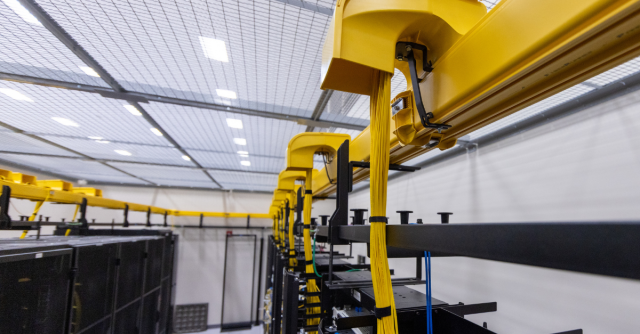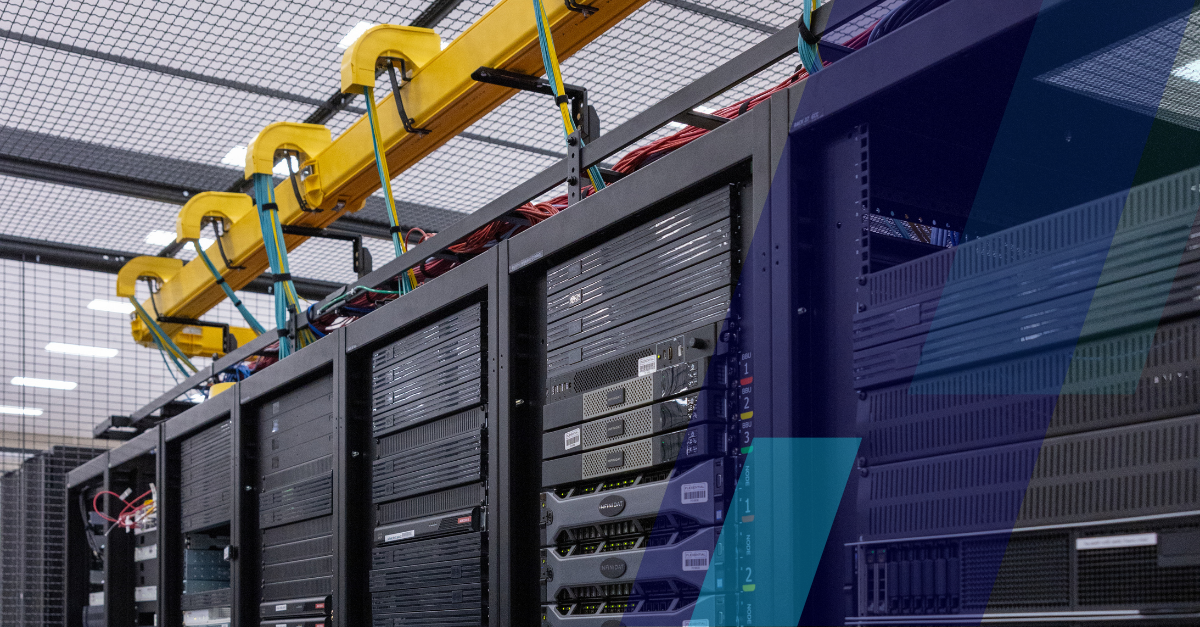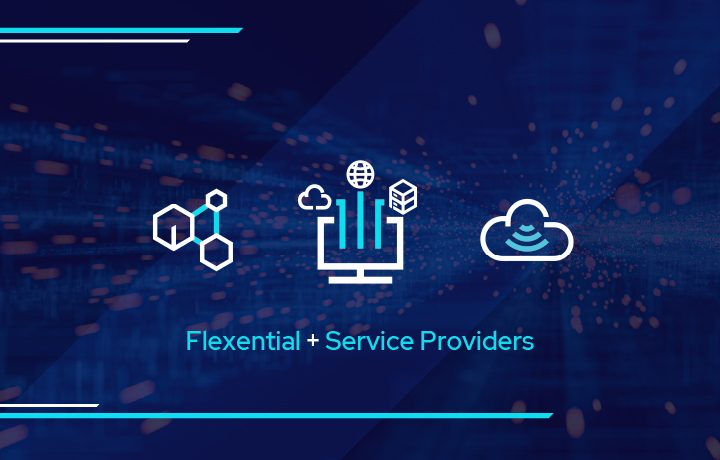Why interconnection matters in retail colocation
Interconnection and retail colocation work together to give your business enterprise-grade network connectivity without enterprise-level costs. If you're exploring colocation options, most conversations focus on rack space, power, and cooling. But here's what providers won't tell you upfront: interconnection capabilities can make or break your colocation experience.

Think about it this way. You wouldn't rent office space without considering Wi-Fi access or how your team will collaborate. The same logic applies to your IT infrastructure. Retail colocation gives you the physical space and power for your servers, but interconnection gives you the network pathways that actually make your technology work.
What you're actually getting:
- Retail colocation: Smaller space rentals (a few racks or quarter cabinets) without massive enterprise commitments
- Network interconnection: Direct, private connections between your equipment and other networks, cloud providers, or business partners
- The result: Dedicated pathways that are faster, more secure, and more reliable than public internet
Why this matters now: Your business relies on cloud applications, remote workers, and digital partnerships in ways that didn't exist five years ago. The old model of "just getting connected to the internet" doesn't work when your success depends on how quickly and securely your systems communicate.
The shift to distributed IT
Your IT infrastructure probably looks nothing like it did a few years ago. Instead of everything in one office server room, you're managing:
- Cloud services (AWS, Microsoft 365, Google Workspace)
- Remote employees needing secure access
- Branch offices connecting to central systems
- On-premises equipment that still needs to integrate
The problem: Basic internet connectivity treats all traffic the same. Your mission-critical data gets the same priority as streaming videos, creating unpredictable performance when you need reliability most.
The challenge for SMBs: You need enterprise-grade connectivity to support distributed infrastructure, but without enterprise budgets or IT teams.
The solution: Retail colocation with interconnection capabilities. Instead of managing complex connections from your office internet, place equipment in a facility already connected to the cloud providers, carriers, and services your business depends on.
Why interconnection is critical in retail colocation
Here's where interconnection moves from "nice to have" to "actually essential" for your business operations. When your equipment sits in a well-connected colocation facility, you're not just renting space - you're buying access to a network ecosystem that can solve real problems you're probably dealing with right now.
Reduces latency, boosts application performance
Every millisecond matters when your team is trying to access cloud applications or customers are using your services. With direct interconnection, your data doesn't have to take the scenic route through multiple internet hops. Instead, it travels on dedicated pathways between your equipment and your cloud providers.
Think about it: if your sales team is constantly waiting for Salesforce to load, or your customer-facing application feels sluggish, those delays add up to lost productivity and frustrated users. Direct cloud connections can cut response times significantly, making your applications feel more responsive and your team more productive.
Enables direct cloud access, partner peering
Rather than accessing your AWS or Microsoft Azure resources through the public internet, interconnection lets you create private connections directly to these cloud providers. This means more predictable performance, better security, and often lower data transfer costs.
The same principle applies to partner connections. If you work closely with suppliers, distributors, or service providers who need secure access to specific systems, interconnection lets you create dedicated links instead of opening up internet-facing access points that create security risks.
Helps support compliance and security models
Many businesses need to meet specific compliance requirements around data handling and security. When you're moving sensitive information between your systems and cloud services over the public internet, you're adding variables you can't control. Interconnection gives you private, dedicated pathways that make it easier to maintain the security posture your compliance requirements demand.
This is especially important if you're in healthcare, finance, or other regulated industries where data privacy isn't just good practice; it's legally required.
How interconnection fits into your colocation strategy
When evaluating colocation services providers, interconnection should be part of your core decision-making process. The connectivity options available directly impact infrastructure performance and future adaptability.
Start with your current pain points:
- Inconsistent application performance?
- Struggling with secure partner connections?
- High bandwidth costs for cloud data transfers?
A data center interconnect solution can address these challenges, but only if the provider has the right network partnerships and infrastructure in place.
Think of interconnection as flexibility insurance. Today you might need AWS and key software vendor connections. Six months from now, you might want Microsoft Azure or secure links to new business partners. Extensive interconnection options mean you can adapt without moving equipment or renegotiating contracts.
Key requirement: Find a provider that treats interconnection as a core service, not an expensive add-on. Look for existing relationships with major cloud providers and network carriers, as this means faster deployment and more cost-effective solutions when you need new connections.
Use cases for SMBs
Let's get specific about how interconnection actually works in practice for businesses like yours.
Multi-cloud connectivity: Your business probably uses AWS for applications, Microsoft 365 for productivity, and maybe Google Workspace for collaboration. Instead of routing all this traffic over the public internet, direct cloud connections create dedicated pathways to each provider. Result: consistent performance and often reduced data transfer costs.
Partner and supplier access: Need to share real-time inventory with distributors or give suppliers secure access to specific systems? Interconnection creates direct links instead of exposing services to the general internet. Perfect for B2B companies sharing sensitive business data.
Branch office connectivity: Rather than managing individual internet connections and VPNs for each location, create a hub-and-spoke design with your colocation facility at the center. You get better performance control, easier security management, and often lower overall connectivity costs.
Managed service integration: Direct pathways between your infrastructure and MSP services mean faster backups, more responsive remote support, and better integration with the services you're already paying for.
Debunking common misconceptions
Let's address three myths that might be holding you back from considering interconnection:
"Retail colocation is just racks and power." Modern SMBs often have more complex connectivity needs than traditional enterprises because they use a wider variety of cloud services, SaaS applications, and digital partnerships. Understanding the difference between retail vs wholesale colocation is important, as retail colocation gives smaller businesses access to enterprise-grade infrastructure, including interconnection capabilities, without massive commitments.
"Only enterprises need advanced networking." If your team relies on cloud applications for productivity, your customers expect fast-loading services, or your business depends on real-time data sharing with partners, you need the same reliable connections that enterprises use. The difference isn't in the quality of connectivity you need; it's in the scale.
"Interconnection is too complex for our IT team." Reputable colocation providers handle most of the technical complexity. They manage physical connections, monitor performance, and provide support when you need changes. Your team's role is typically configuring equipment to use the connections, similar to setting up any network service.
Your business deserves professional-grade solutions that match your operational requirements, not your company size.
What to look for in a retail colocation provider
When evaluating providers, interconnection capabilities should be at the top of your checklist. Here's what separates providers who understand modern connectivity solutions from those offering basic rack space:
Extensive network ecosystem: Established relationships with major cloud providers, network carriers, and technology partners. You need access to hundreds of carriers and hyperscale cloud providers so you're not limited when business needs change.
24/7 technical support: Experienced technicians with proactive monitoring and maintenance. When interconnection is critical to operations, you need support teams who understand both the technology and your business requirements.
Financial stability: Proven track records of successful expansion and continued investment in new technologies. The last thing you want is your provider going out of business after you've moved your infrastructure.
Compliance and security: Physical security measures including perimeter fencing, surveillance, access controls, and multi-factor authentication. Make sure they already meet your compliance standards rather than hoping they'll adapt later.
Scalability: Ability to add connections, increase power, or expand space without major service interruptions. The facility should handle current demands and scale for future growth.
Geographic advantages: Proximity to fiber networks and internet exchange points for high-speed connectivity and lower latency. Location near these hubs means better performance.
The right provider feels like a strategic partner, not just a vendor. They should understand your business goals and recommend solutions for current needs while positioning you for future growth.
Ready to explore how interconnection can improve your operations? Contact our experts to discuss your infrastructure goals, schedule a data center tour to see our facilities, or explore our resource library for more connected infrastructure strategies.
Key takeaways: Making interconnection work for your business
Bottom line: Interconnection and retail colocation create the network foundation your business needs to compete effectively. Whether you're dealing with slow cloud applications, struggling with partner connectivity, or planning for growth, the right interconnection strategy solves today's problems while setting you up for future opportunities.
Start with your pain points. If your team is frustrated with application performance, you're paying high bandwidth costs, or you need secure partner connections, interconnection addresses these challenges directly.
Think beyond basic connectivity. Retail colocation with interconnection gives you access to enterprise-grade network infrastructure, sized for your business. You're getting professional solutions that match your operational requirements.
Choose providers strategically. Look for extensive network partnerships, proven technical expertise, and scalability. The cheapest option today might cost more long-term if it can't adapt to changing needs.
Plan for growth. Your interconnection strategy should support where your business is going. Choose solutions that expand as you add cloud services, partnerships, or locations.
Interconnection and retail colocation FAQs
What is network interconnection in the context of retail colocation? Network interconnection in retail colocation is the process of directly connecting your systems and data with other businesses, cloud providers, or networks housed in the same data center facility. Instead of relying on public internet connections, you use secure, high-performance pathways to share information, access cloud services, and support your business applications.
How does interconnection differ between retail and enterprise colocation? The technology is the same, but the scale and approach differ. Enterprise colocation typically involves custom-built connections for large deployments, while retail colocation offers pre-established network partnerships and standardized connection options that are more accessible and cost-effective for smaller businesses.
Why is interconnection important for small businesses using colocation? Small businesses often rely on multiple cloud services, remote workers, and digital partnerships just like larger companies. Interconnection ensures these connections perform reliably and securely, giving SMBs access to enterprise-grade connectivity without enterprise-level complexity or costs.
How does interconnection support business continuity and disaster recovery? Interconnection enables direct connections to backup sites, disaster recovery services, and multiple cloud providers. If one connection fails, traffic can quickly route through alternative pathways, minimizing downtime and ensuring business operations continue smoothly.
What should I look for in a retail colo provider's interconnection offerings? Focus on network diversity (multiple carrier options), established cloud provider partnerships, flexible connection types, reliable technical support, and the ability to add new connections without major service disruptions as your business grows.







